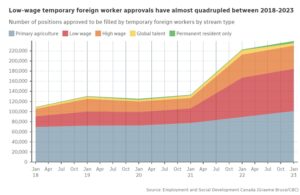The fast food and restaurant industry is a significant employer of temporary foreign workers in Canada. According to a CBC article, after farm and greenhouse workers, roles such as cooks, food service supervisors, food counter attendants, and kitchen helpers had the most approvals for temporary foreign workers last year. For instance, the number of approved positions for food counter attendants surged from 170 in 2018 to 8,333 in 2023. The top 10 employers with the most approved positions were fast food operators.
Understanding the Context
The relationship between the food service industry and the Temporary Foreign Worker Program (TFWP) has been challenging. Roughly a decade ago, controversy surrounding the industry’s use of the program led the federal government to impose a temporary moratorium on that sector. However, labor market conditions have since evolved, prompting significant changes to the program.
In 2022, citing significant labor shortages, the federal government doubled the proportion of low-wage workers businesses could hire through the TFWP from 10% to 20% of their workforce. Specific sectors, particularly those struck by the pandemic, including food service, were allowed to hire up to 30% of their low-wage staff through the program.

A significant benefit of the TFWP for businesses is the stability it offers. Workers’ permits are tied to their employers, which means they cannot easily quit to work for a rival business. The Canadian Franchise Association notes that this guarantees workers will remain employed with their employer for the agreement term.
Despite the benefits, the experiences of temporary foreign workers in Canada are often mixed. Some employers adhere strictly to the rules and support workers in their transition to permanent residency. In contrast, others may take advantage of their vulnerable position by underpaying them. Marco Luciano, director of the advocacy group Migrante Alberta, emphasizes that while Canada is appealing for its potential pathway to permanent residency, the treatment of temporary foreign workers can vary significantly.
Addressing Labor Shortages
In response to labor shortages, the federal government has allowed businesses to hire a higher proportion of low-wage workers through the Temporary Foreign Worker Program (TFWP). This adjustment enables companies to maintain operations and provides temporary foreign workers with stable employment opportunities tied to their employers.
Our Role
-
Connecting Wyrkers with Employers:
Through our platform, we connect temporary foreign wyrkers with employers in need. Our process involves a thorough assessment of the wyrker’s skills and experience, followed by a careful matching with job opportunities in the fast food and restaurant industry. This ensures that businesses can find the labor they need to operate smoothly and secure stable employment.
-
Enhancing Wyrker Experience:
Temporary foreign wyrkers often have mixed experiences in Canada. While some employers are supportive and help wyrkers transition to permanent residency, others may not follow the rules as diligently. We can enhance the wyrker experience by partnering with reputable employers committed to fair treatment and compliance with TFWP regulations. This ensures that wyrkers have positive and supportive job experiences.
-
Providing Support Services:
We offer additional support services to temporary foreign workers, such as assistance navigating the TFWP, understanding their rights, and accessing resources for permanent residency applications. Wyrk helps wyrkers feel more secure and valued in their roles by providing this support.
-
Advocating for Wyrkers:
At Wyrk, we are staunch advocates for temporary foreign workers. We collaborate with advocacy groups, government bodies, and industry associations. By being a strong voice for wyrkers, we can help shape policies and practices that benefit both wyrkers and employers, instilling a sense of reassurance in the audience about our commitment to wyrkers’ rights.
-
Creating Success Stories:
Through our program, we aim to create more success stories like Ruth St-Martin’s. Ruth, a former temporary foreign worker, moved from the Philippines to work at an Arby’s restaurant in Alberta. Her positive experience with a supportive employer led her to obtain permanent residency and a career in the oil and gas industry. These success stories serve as a beacon of inspiration, motivating us to ensure that wyrkers are matched with employers who value and support them.
Conclusion
We hope to play a pivotal role in enhancing job opportunities for temporary foreign workers in Canada. By connecting wyrkers with reputable employers, providing support services, and advocating for wyrkers’ rights, we can help create positive and meaningful wyrk experiences that lead to long-term career growth and stability for temporary foreign workers. We invite you to join us in this important endeavor.
We are writing this in response to the insightful article by CBC. Read more about it here.










